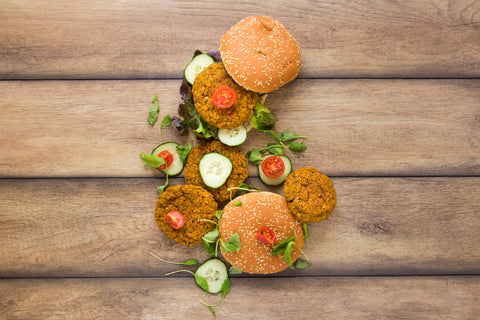
Vegan burgers: let's clarify
What does vegan mean?
The dictionary defines vegans as those who choose to eliminate all products of animal origin from their diet, including derivatives such as eggs and milk, choosing to eat exclusively plant-based products. Food science has made giant strides in this sector in recent years, so as to offer products similar to the originals, but with the peculiar characteristics of those who follow the trend of being vegan. Now. Carnivores aside, an objective consideration needs to be underlined. "Similar" foods are similar in appearance and not in substance, therefore to replicate something you need to create a copy, sometimes not very beautiful unfortunately.

Vegan burger vs meat burger
In addition to the current of thought, it is necessary to choose and learn to carefully read the labels of vegan burgers which, unlike their step-brother made of beef, contain chemical preparations that are not always completely healthy and genuine. The colourants, thickeners and other components serve to remember, on a commercial level, the much more well-known and inviting relative, and at the same time respect the idea of those who support the vegan movement. Now, inconveniencing the original relative is a rather complicated affair and difficult to change. The beef hamburger , just like all other meat products, must comply with a certain protocol which incorporates hygiene and health rules.
To obtain a specific meat product, among other definitions, you need to move away from some antibiotics and enhancers that could "ruin" the meat and compromise the flavor and quality. In the world of vegan burgers, the issue of respecting the protocol is canceled since there is the clear absence of the "incriminated" ingredient, namely meat. What to do? The label becomes the only source of wisdom to be read carefully, then you need to ask yourself questions and find the answers, before putting the product in the cart and convincing yourself that it is healthy and perfect for a vegan diet.
Vegan burger: a question of connections
Among the main disputes that revolve around the copying of succulent and fragrant meat burgers is the need to create a product that is as compact and inviting as its relative. If the preparation takes place at home and it is something homemade and home made, natural thickeners come in handy: potatoes, legumes, flour, quinoa and breadcrumbs. If, however, the preparation is industrial, you need to pay attention to the ingredients, avoiding products in which there are too many thickeners, stabilizers and colorings despite natural ingredients or extracts.
Another issue that vegans too often tend to minimize is the caloric intake that a similar product can contain and achieve. Choosing a vegan diet without having a deep knowledge of the path you are taking is a terrible starting point as you risk compromising your balance by introducing an excessive quantity of proteins and chemical substances without being aware of it.

Blended burger: question of armistice
Getting vegans and carnivores to agree is almost impossible, unless both sides agree to a compromise. If on the one hand we need to accept the presence of a percentage of meat , on the other we need to fill the empty space with something healthy: vegetables are a ready-to-use solution. Excessive consumption of any food is harmful to the body, but this concept applies to meat as much as to tofu or seitan or chocolate, in short, to everything.
Here, in the face of an ever-growing society with meat as its main food, we need to make up for the lack of vegetables and educate towards a more conscious use. Following this concept and trying to bring vegans and carnivores together, some American chains have introduced a new food: the blended burger. On the one hand, the certainty of eating meat, and not something similar, alongside the desire to integrate the lack of vegetables by adding new and perfect flavors in combos.
Vegan burger yes or no?
No. The answer is a categorical no if the vegan burger is prepared in a laboratory, if grandma is unable to decipher even 1% of the ingredients. The presence of chemical components can be quite harmful, which is why you need to pay the utmost attention.
Yes. The choice veers towards a resounding yes if the desire to experiment in the kitchen also welcomes the idea of proposing something exclusively plant-based. Zero chemistry, just nature. The loss is the possible shelf life of the product which perhaps cannot be kept in the refrigerator for a long time, but a laid table hardly allows you to have too many leftovers. Perhaps. The idea of completely supporting the vegan diet without paying the right attention to the chemical components makes one lean towards an "also no". However, trying new ideas and solutions in the kitchen capable of surprising and enriching the table with color and flavor suggests a "why not?".

Vegan HamBurger, a matter of details
Clear! Here is the solution, once again you need to use your head and be economical. A bit of everything seems to be the right compromise for those who want to eat less meat and want to get closer to the vegetarian or vegan world. The advice is always to choose Italian meat of certified origin and to approach such a particular diet with the right awareness. Preferring to be omnivorous therefore remains the wisest decision. Even more so if you choose to bring to the table healthy and genuine cuts of beef and pork resulting from a controlled and certified supply chain.

